|
|
|
Sort Order |
|
|
|
Items / Page
|
|
|
|
|
|
|
| Srl | Item |
| 1 |
ID:
174191
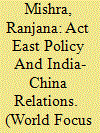

|
|
|
|
|
| Summary/Abstract |
The Act East policy is aimed to put East in centrality in terms of economic activity and political presence to counter the expansionist neighborhood. This in turn will enlarge the domain of the east and strengthen India’s place in global economy which is a win-win situation for India.
|
|
|
|
|
|
|
|
|
|
|
|
|
|
|
|
| 2 |
ID:
134050
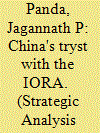

|
|
|
|
|
| Publication |
2014.
|
| Summary/Abstract |
Engaging with a multilateral body requires constructive foreign policy forethought, especially for a country that is not a fully fledged member of that body. China's overtures to the Indian Ocean Rim Association (IORA) exemplify this approach. The Indian Ocean and India are the two most immediate elements in China's policy approach to the IORA. With 20 member states, extra-territorial major powers as important dialogue partners, and the increasing importance of energy politics in the region, the IORA today is a significant multilateral body in China's calculus. Beijing's involvement with the IORA bespeaks the construct and strategy of a great power. For India, China's power construct in this matter poses three challenges: Beijing as a maritime power; Beijing as an economic power; and Beijing as a polygonal power.
|
|
|
|
|
|
|
|
|
|
|
|
|
|
|
|
| 3 |
ID:
133612
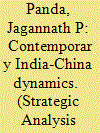

|
|
|
|
|
| Publication |
2014.
|
| Summary/Abstract |
This review essay examines the significance of India-China relations against the background of the current phenomenon of a multipolar world in the light of four recent publications on the subject. Tien-sze Fang's and Jeff M. Smith's works discuss the current facets of India-China relations, while William Antholis's and Carl J. Dahlman's works deal with the character and standing that India and China bring to their regional and global discourse. After reviewing the core of these books, this essay will seek to locate the dialogue and import of India-China relations in two constructive settings: first, the versatility of this relationship in a multipolar world order; second, why this relationship is important to the future of multipolar world politics. In the official idiom, India-China dynamics are not confined to the bilateral ambience. For example, a joint statement issued on the occasion of the visit of Premier Li Keqiang to India (May 20, 2013) records that 'There is enough space in the world for the development of India and China … As the two largest developing countries in the world, the relationship between India and China transcends bilateral scope and has acquired regional, global and strategic significance'.1 This official endorsement comes against the background that the year 2014 is the 60th anniversary of the occasion when the Panchasheel discourse was first enunciated.
|
|
|
|
|
|
|
|
|
|
|
|
|
|
|
|
| 4 |
ID:
155641
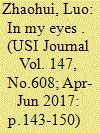

|
|
|
| 5 |
ID:
135480
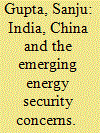

|
|
|
|
|
| Summary/Abstract |
With the imperative of energy security assuming salience in all foreign policy considerations, it is significant that the two countries accept the significance of entering into cooperative and mutually beneficial relations. The fact is that aggressive bidding by either party only pushes up the price of the asset to the advantage of the seller and the disadvantage of both bidders.
|
|
|
|
|
|
|
|
|
|
|
|
|
|
|
|
| 6 |
ID:
135468
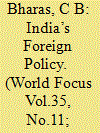

|
|
|
|
|
| Summary/Abstract |
Thus, it is clear that “With the gradual accretion of power by states such as China and India, the world may now be witnessing a major shift in power dynamics.” The Sino-Indian security relations shall have a tremendous impact on future and over all stability of Asia. When the security system of a state shall be at stake, when internal disturbance shall be cause of concern and in an environment of international terrorism, a security-centric national policy will of course, be given priority.
|
|
|
|
|
|
|
|
|
|
|
|
|
|
|
|
| 7 |
ID:
157330
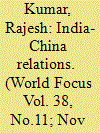

|
|
|
|
|
| Summary/Abstract |
China’s military rise in recent years has enhanced its strategic engagement with countries within and around the region. China’s strategic engagements with South Asian countries like Pakistan, Sri Lanka, Nepal and Bangladesh has placed India in a mode of strategic arms race with its largest neighbour China. Debates have been taking place that can India afford to fight two and a half war, that too, during recent Dokalam (India-Bhutan-China triangle border area) crisis with China that lasted from June 16 till August 28,2017.
|
|
|
|
|
|
|
|
|
|
|
|
|
|
|
|
| 8 |
ID:
142141
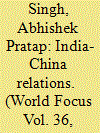

|
|
|
|
|
| Summary/Abstract |
India's trade deficit with China is set to reach record levels in 2015, new trade figures show, with the imbalance after the first three quarters of the year already nearing last year's mark. As India has grown its consumers and corporations have been importing an increasing amount of China’s affordable products but India’s exports to China have not kept pace. While China has a cost advantage in most products, analysts say India is very competitive in the pharmaceutical, textile and some services sectors. That is where it needs more access if it wants to start to rectify the skewed trade balance. Similarly, frictions along the border and Chinese incursions mounted in recent years remain a serious security concern for India. This provides ample scope for anti-China constituency in India. Also China’s solidarity with Pakistan has wider ramifications, especially from an Indian standpoint towards bilateral relations.
|
|
|
|
|
|
|
|
|
|
|
|
|
|
|
|
| 9 |
ID:
146964
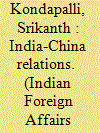

|
|
|
|
|
| Summary/Abstract |
To prevent the emergence of any conflict situation, both China and India need to usher in an intensive dialogue mechanism across the board, with each other’s core sensitive issues discussed and solutions implemented. Compliance on this issue is a matter of power equations; however, in a similar asymmetrical power equation, India needs to understand that China did extract concessions from the United States previously.
|
|
|
|
|
|
|
|
|
|
|
|
|
|
|
|
| 10 |
ID:
177295
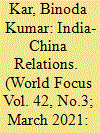

|
|
|
|
|
| Summary/Abstract |
Kishore Mahbubani (2018) in his book “Has the west lost it?” A Provocation categorically puts forth the thesis that the dominance of the West led by the USA is going to come to an end and China is going to rise to the occasion to become the next superpower of the world. Although this thesis has been rejected by some important thinkers in the domain of International relations like John Mearsheimer nevertheless a thorough observation of the way international politics unfolds presents a clear picture that China is going to play a role that the USA had been playing over the past few decades.
|
|
|
|
|
|
|
|
|
|
|
|
|
|
|
|
| 11 |
ID:
135520
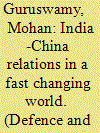

|
|
|
|
|
| Summary/Abstract |
This centaury has been good for India, so far. its economy has been bounding along, finally reflecting a closer correlation between promise and performance. the demographic trends have never been so propitious. Given the current trends and informed forecasts India’s Gross Domestic Product (GDP) is expected to double every seven or eight years. it is climbing closer to $ 2 trillion now. Thus, by, say, 2050, we could be looking at a GDP in real terms of over $ 40 trillion. if the current trends were to do slightly better, and be maintained, by 2050 or even earlier, India could conceivably emerge with the world’s largest GDP.
|
|
|
|
|
|
|
|
|
|
|
|
|
|
|
|
| 12 |
ID:
156879
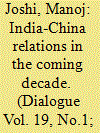

|
|
|
| 13 |
ID:
130083
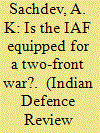

|
|
|
|
|
| Publication |
2014.
|
| Summary/Abstract |
During the past decade, zIndia's Defence preparedness has steadily and inexorably deteriorated despite constant clamor by the Defence forces tor modernisation and up gradation to meet assigned roles and tasks. Meanwhile, Pakistan's anti-India stance and Chinese aggressive actions and iterations have neither helped to push away the trepidation of possible military conflagration with either one individually, nor done anything to liquidate the possibility of a two-front war. A combined and collusive threat from China and Pakistan would overstretch the Indian military machinery and, given the inordinately delayed modernisation in certain domains, could well be a recipe for an ignominious debacle reminiscent of the 1962 India-China War.
|
|
|
|
|
|
|
|
|
|
|
|
|
|
|
|
| 14 |
ID:
133057
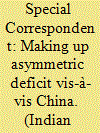

|
|
|
|
|
| Publication |
2014.
|
| Summary/Abstract |
China's surging economic power has been matched by increasing military might including investments in an aircraft carrier, anti-ship ballistic missiles, satellites, modern weapon systems and other hardware. In contrast, a decade at neglect at the Indian Military has widened the capability gap vis-a-vis PLA exponentially. With the new government in power headed by a dynamic Prime Minister, there is speculation of a new era in lndia-China relations. However, it would be prudent to remember that it is the capabilities that matter even it intentions change overnight.
|
|
|
|
|
|
|
|
|
|
|
|
|
|
|
|
| 15 |
ID:
135456


|
|
|
|
|
| Summary/Abstract |
PM Narendra Modi’s evolving India’s foreign policy is boldly marked with clear goals and objectives for aspiring India to become a serious and dominant player in the field of international affairs which, unfortunately, is characterised by super/ major power dominance and hegemony and utter lawless less and where naked power rules the roost. To deal such an ugly situation in international relations he has successfully chalked out a sound and effective strategy, meaning thereby, a method for use of social, economic, political, cultural, military, science &technological developments etc.
|
|
|
|
|
|
|
|
|
|
|
|
|
|
|
|
| 16 |
ID:
177777
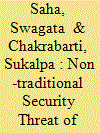

|
|
|
|
|
| Summary/Abstract |
South Asia has emerged as a major challenge in dealing with COVID-19 virus in terms of its demographics, economy, social values, political ambition and geographical location. The pandemic viewed through the prism of non-traditional security (NTS) threat presents new challenges and demands reworking of conventional governance mechanisms. India is the South Asian hegemon, and China is the single largest immediate neighbour with expansionist ambition in the region. Two most populous countries—one has been the epicentre of the virus, while the other is one of the most widely affected. Their public health and governance trajectory during the pandemic and their health diplomacy in the region have overtures for security architecture of South Asia in post-COVID-19 world. A lone statist approach and legal–institutional officialdom fail to appreciate the instrumentalities of an unconventional security threat like COVID-19. This calls for a more inclusive and comprehensive approach to deal with NTS threat, in general, and epidemiological disease, in particular. This by no means indicating a retreat of the state rather a proactive role in articulating interests of more inclusive categories and, in doing so, the state consolidates its role of governance and becomes a significant point of integration.
|
|
|
|
|
|
|
|
|
|
|
|
|
|
|
|
| 17 |
ID:
174200
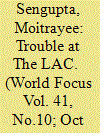

|
|
|
|
|
| Summary/Abstract |
China’s ‘peaceful rise’ policy, which came close on the heels of Deng’s strategy, was articulated by Chinese leaders in 2003 to similarly ward off international fears about Beijing’s growing economic and political strength. In 2004, Premier Wen Jiabo famously explained, China’s peaceful rise “will not come at the cost of any other country, will not stand in the way of any other country, nor pose a threat to any other country”2.
|
|
|
|
|
|
|
|
|
|
|
|
|
|
|
|
| 18 |
ID:
133737
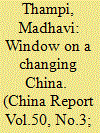

|
|
|
|
|
| Publication |
2014.
|
| Summary/Abstract |
It was not until the 1940s that India and China established diplomatic relations in modern times. This article concerns itself with the observations and impressions, based on their time in China, of two of the earliest of modern India's envoys to China, K.P.S. Menon and K.M. Panikkar. The 1940s were a watershed period in the history of both India and China, when both countries found themselves in the midst of momentous transitions. The two Indian envoys had a ringside seat from where they could closely observe and comment on the complex situation unfolding before them in China. As two articulate Indians who observed China at first hand, the writings of Menon and Panikkar offer us a unique and empathetic portrayal of China, which they viewed as a fellow Asian country facing enormous challenges not dissimilar to those of India. They show us that the governments of both India and China in this period, despite their many other preoccupations, were deeply interested in developments in the other country and in their relations with each other. At the same time, these writings also reveal that the very circumstances of the emergence of independent India and the People's Republic of China, both with a distinct sense of their own civilisational greatness and sharing a common boundary, carried latent tensions.
|
|
|
|
|
|
|
|
|
|
|
|
|
|
|
|
|
|
|
|
|